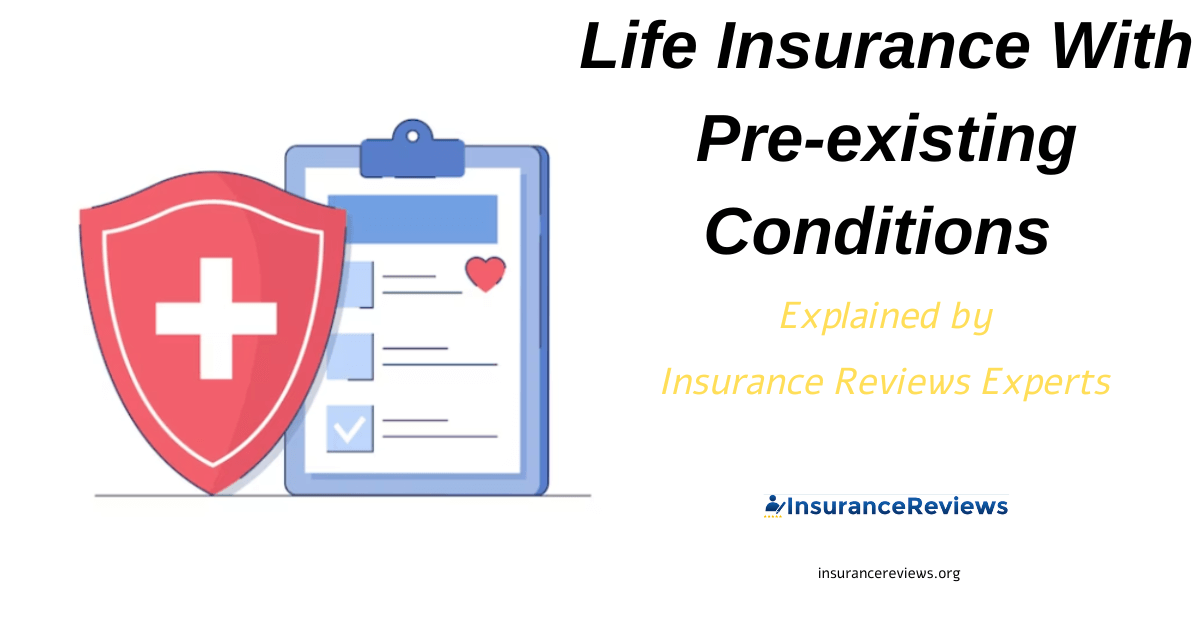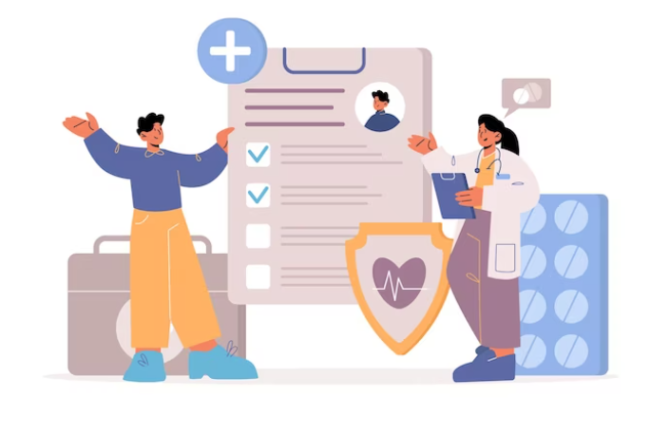
Can you get life insurance despite having been diagnosed with a certain health condition? Depending on the severity of your health problem and its management, it is possible to get life insurance with pre-existing conditions at good rates. If you’re otherwise healthy, there are plenty of options to choose from.
Here’s a study conducted by the Department of Health and Human Services:
- Up to 1 in 5 non-elderly Americans with a pre-existing condition is uninsured.
- About 19 to 50% of non-elderly Americans are diagnosed with pre-existing health conditions.
- Up to 75 million American employees with employer-based coverage have a pre-existing condition from life-threatening illnesses such as:
- Asthma
- Cancer
- Diabetes
- Coronary Heart Disease
- And other chronic health problems
- 48 to 86% of older Americans (ages 55-64) are diagnosed with some type of pre-existing condition.
- About 12 to 30% of currently healthy Americans are likely to develop a pre-existing condition over the next 10 years which may seriously limit their options without the help of the Affordable Care Act.
What Is A Pre-existing Life Insurance For Pre-existing Conditions

Life insurance with pre-existing conditions points to insurance policies that are available to individuals who have a medical condition that existed before they applied for the policy.
Pre-existing conditions can include a wide range of medical conditions, such as:
- Heart diseases.
- Cancer.
- Diabetes, and other known illnesses.
Before the passage of the Affordable Care Act (ACA) in the United States, it was common for health insurance companies to deny coverage or charge higher premiums to individuals with pre-existing conditions.
However, the ACA includes provisions that prohibit insurance companies from denying coverage or charging higher premiums based on pre-existing conditions.
These conditions may affect the premium and coverage of a life insurance policy.
What To Do If You Have A Pre-existing Condition
Insurance companies may require people with pre-existing conditions to undergo medical underwriting, which involves completing a health questionnaire,
submitting medical records, and possibly undergoing a medical examination.
Based on the information, the insurance company will determine the individual’s insurability, which may affect the premium and coverage amount.
Eligibility For Life Insurance With Pre-existing Conditions
Individuals with pre-existing conditions may be eligible for different types of life insurance policies which include term life insurance, permanent life insurance, or guaranteed issue life insurance.
Term life insurance provides coverage for a certain time period, while permanent life insurance provides coverage for life.
Guaranteed issue life insurance is a type of policy that is available to anyone regardless of their health status, but it has lower coverage amounts and higher premiums.
How Do Pre-existing Conditions Affect The Cost of Life Insurance?
The presence of a pre-existing condition can affect the cost of life insurance, as insurers consider it a risk factor that may increase the likelihood of the policyholder’s death.
Insurance companies assess the risk of the person with a pre-existing condition based on different factors, such as:
- The severity of the condition.
- Age and overall health.
- The likelihood of complications or related illnesses.
As a result, people with pre-existing conditions may have to pay higher premiums or may be denied coverage altogether.
Health Insurance With Pre-existing Conditions
Under the ACA, insurance companies must offer coverage to individuals with pre-existing conditions, and they cannot charge higher premiums or impose waiting periods for coverage.
Additionally, ACA requires all health insurance plans to cover essential health benefits, including preventive services, prescription drugs, and hospitalization.
The following are what determines the person’s eligibility for life insurance with pre-existing conditions:
Type of condition
Life insurance for people with pre-existing conditions can be more expensive than for those without such conditions. Some insurance providers may exclude coverage for certain pre-existing conditions from their policies.
Current health status
Life insurance companies often require applicants to disclose any pre-existing medical conditions during the underwriting process. Depending on the type of pre-existing condition, the policy may come with higher premiums or exclusions related to it.
How long have you had this condition for?
For further evaluation, individuals with pre-existing conditions may be asked how long they have had a medical diagnosis as part of their underwriting process.
The duration can affect the risk level associated with insuring the individual, which in turn can impact the premiums and coverage offered.
Classifications
Life insurance companies classify medical conditions into different categories to assess the risk associated with insuring an individual with pre-existing medical conditions.
These categories can vary slightly between insurance companies, but here are some common classifications:
- Standard – This classification is given to individuals who are generally healthy and do not have any pre-existing medical conditions that could increase their risk of death.
- Preferred – This rating is given to individuals who are in excellent health and have a low risk of developing any health conditions.
- Preferred Plus – This rating is given to individuals who are in exceptional health and have an extremely low risk of developing any health conditions.
- Substandard or impaired risk – This classification is given to individuals who have one or more pre-existing medical conditions that could potentially shorten their lifespan. This can include conditions such as high blood pressure, diabetes, heart disease, and cancer.
- Declined – This classification is given to individuals who have medical conditions that are deemed too high of a risk for the life insurance company to provide coverage.
These classifications can also depend on the type, severity, and management of the pre-existing condition.
For example, an individual with well-managed diabetes may be classified as substandard or standard, while an individual with uncontrolled diabetes may be declined.
How To Buy Life Insurance With Pre-existing Conditions?

Buying life insurance with pre-existing conditions may be more challenging than those without.
But, it is possible to get life insurance coverage with pre-existing conditions by following these steps:
Consider looking at reputable insurance companies for coverage.
- Look for insurance companies that specialize in providing coverage to people with pre-existing conditions – Some insurance companies may be more willing to provide coverage than others. You can also work with an insurance broker who can help you find an insurance company that is willing to offer coverage to people with your specific condition.
- Be upfront about your condition – When you apply for life insurance, be honest and transparent about your pre-existing condition. Provide as much information as possible about your condition, including your medical history, current treatment, and any medications you are taking.
- Complete a medical exam – Most life insurance policies require a medical exam. The results of the exam will help the insurance company determine your premium and whether to offer you coverage. Make sure to follow any instructions provided by the insurance company regarding the medical exam.
- Consider a guaranteed issue policy – If you have a severe pre-existing condition, you may not be able to get a traditional life insurance policy. In this case, you may want to consider a guaranteed issue policy. These policies do not require a medical exam, but they may have higher premiums and lower death benefits.
- Work with an insurance agent or broker -An experienced insurance agent or broker can help you navigate the process of buying life insurance with a pre-existing condition. They can help you find the right insurance company and policy for your needs and budget.
How To Improve My Chances of Buying Life Insurance with a Pre-existing Condition?

There are steps you can take to improve your chances of getting coverage:
- Honesty and transparency about your condition. Don’t try to hide your pre-existing condition from the insurance company. Be transparent about your health history and provide accurate information to the insurer.
- Ask for assistance from a knowledgeable agent. A knowledgeable insurance agent can help you navigate the application process and find insurers that specialize in insuring people with pre-existing conditions.
- Choose the right type of policy. Depending on your situation, a guaranteed issue or simplified issue policy may be a better fit than a fully underwritten policy.
- Be prepared to pay higher premiums. Insurance companies may charge higher premiums for individuals with pre-existing conditions. It’s important to shop around and compare rates from multiple insurers to find the best deal.
- Take steps to manage your condition. Taking the utmost care to manage your condition, such as following your doctor’s recommendations and maintaining a healthy lifestyle, can help demonstrate to insurers that you are a low-risk applicant.
Exercise, diet, lifestyle, treatment plan, regular doctors checkups, buying early.
What Life Insurance Policies Are Best For Those with Pre-existing Conditions?
These are life insurance policies that offer guaranteed acceptance are ideal for those with pre-existing conditions:
Group
Group life insurance policies may have limitations or exclusions for pre-existing conditions. Life insurance companies may require a waiting period or a medical underwriting process to determine the right coverage.
Term Life
This type of policy typically requires a higher premium due to the increased risk associated with preexisting conditions.
Guaranteed Issue
Guaranteed issue for preexisting conditions refers to health insurance companies must offer coverage to individuals regardless of their health status or medical history.
This means that people with preexisting conditions cannot be denied coverage or charged higher premiums because of their health status.
This type of policy is a crucial protection for individuals who may otherwise be unable to access affordable health insurance due to their medical history.
Insurance Riders
Insurance riders for preexisting conditions can provide coverage for specific medical conditions that existed before the insurance policy was purchased.
These riders may come with higher premiums or deductibles than standard policies due to the increased risk associated with preexisting conditions.
No Medical Questions Life Insurance
There are types of no medical questions life insurance that allow individuals to obtain coverage without answering any medical questions or undergoing a medical exam.
It is ideal for individuals who may have pre-existing medical conditions, or who simply do not want to go through the hassle of a medical exam.
Instead, the application process is based on a few simple questions about:
- Age
- Gender
- Smoking habits, and overall health status.
While the premiums for no medical questions life insurance policies are usually higher than traditional life insurance policies, they offer an accessible and convenient way to obtain coverage quickly.
The downside of these policies is that they have lower coverage limits than traditional life insurance policies. This means that individuals may not be able to obtain as much coverage as they would with a policy that requires a medical exam.
Summarize
The availability and cost of life insurance with pre-existing conditions can vary greatly between insurers, so it’s important to seek out reputable insurance providers and compare policies to find the best coverage and rates.
Not all pre-existing conditions will affect the cost of life insurance equally. Some conditions, such as minor allergies or well-managed diabetes, may not have a significant impact on premiums.
There are more severe conditions like cancer, heart disease, or HIV/AIDS can increase premiums substantially, or even lead to denial of coverage.
People wanting to get insured should work closely with their doctors to manage their pre-existing conditions and optimize their overall health, which may improve their insurability and reduce their premiums.
Certain serious medical conditions, such as advanced cancer or severe heart disease, may prevent an individual from qualifying for life insurance coverage.
There are also some high-risk occupations or lifestyle factors, such as skydiving or heavy alcohol use that may also affect one’s eligibility for life insurance.
Hiding your pre-existing medical condition can have serious consequences, including denial of insurance coverage, invalidation of claims, and potential harm to your health. It is important to disclose any relevant medical information to ensure proper care and coverage.
It depends on the severity of your pre-existing condition and the insurance company’s policy.
Some insurance companies offer no medical exam life insurance options for those with pre-existing conditions.
COVID-19 can potentially count as a pre-existing condition for health insurance purposes.
However, it ultimately depends on the specific terms of your insurance policy.
The death benefit of a life insurance policy may be affected if you have a pre-existing condition.
Depending on the insurance company and its terms, it may charge higher premiums or limit the coverage for certain conditions.
If you are denied life insurance, it means the insurer has determined that you are too high-risk to insure.
You may be denied coverage due to a pre-existing medical condition, a hazardous occupation, or a risky lifestyle.
FAQ
Which medical conditions prevent you from buying life insurance?
Certain serious medical conditions, such as advanced cancer or severe heart disease, may prevent an individual from qualifying for life insurance coverage.
There are also some high-risk occupations or lifestyle factors, such as skydiving or heavy alcohol use that may also affect one’s eligibility for life insurance.
What happens if I hide my pre-existing medical condition?
Hiding your pre-existing medical condition can have serious consequences, including denial of insurance coverage, invalidation of claims, and potential harm to your health. It is important to disclose any relevant medical information to ensure proper care and coverage.
Can I buy life insurance without a medical exam, if I have a pre-existing condition?
It depends on the severity of your pre-existing condition and the insurance company’s policy.
Some insurance companies offer no medical exam life insurance options for those with pre-existing conditions.
Does COVID-19 count as a pre-existing condition?
COVID-19 can potentially count as a pre-existing condition for health insurance purposes.
However, it ultimately depends on the specific terms of your insurance policy.
How is the death benefit affected when you buy life insurance with a pre-existing condition?
The death benefit of a life insurance policy may be affected if you have a pre-existing condition.
Depending on the insurance company and its terms, it may charge higher premiums or limit the coverage for certain conditions.
What happens if I’m denied life insurance?
If you are denied life insurance, it means the insurer has determined that you are too high-risk to insure.
You may be denied coverage due to a pre-existing medical condition, a hazardous occupation, or a risky lifestyle.




